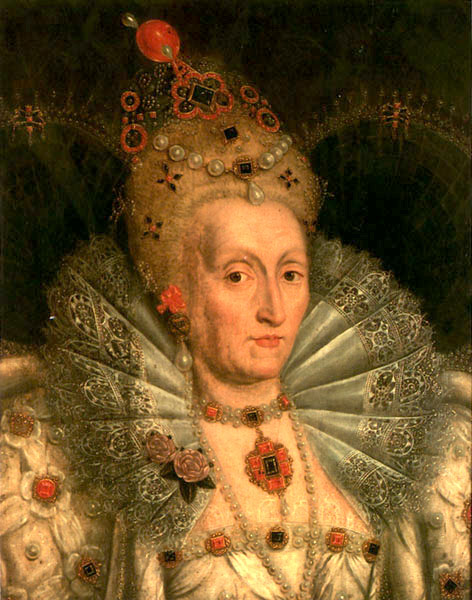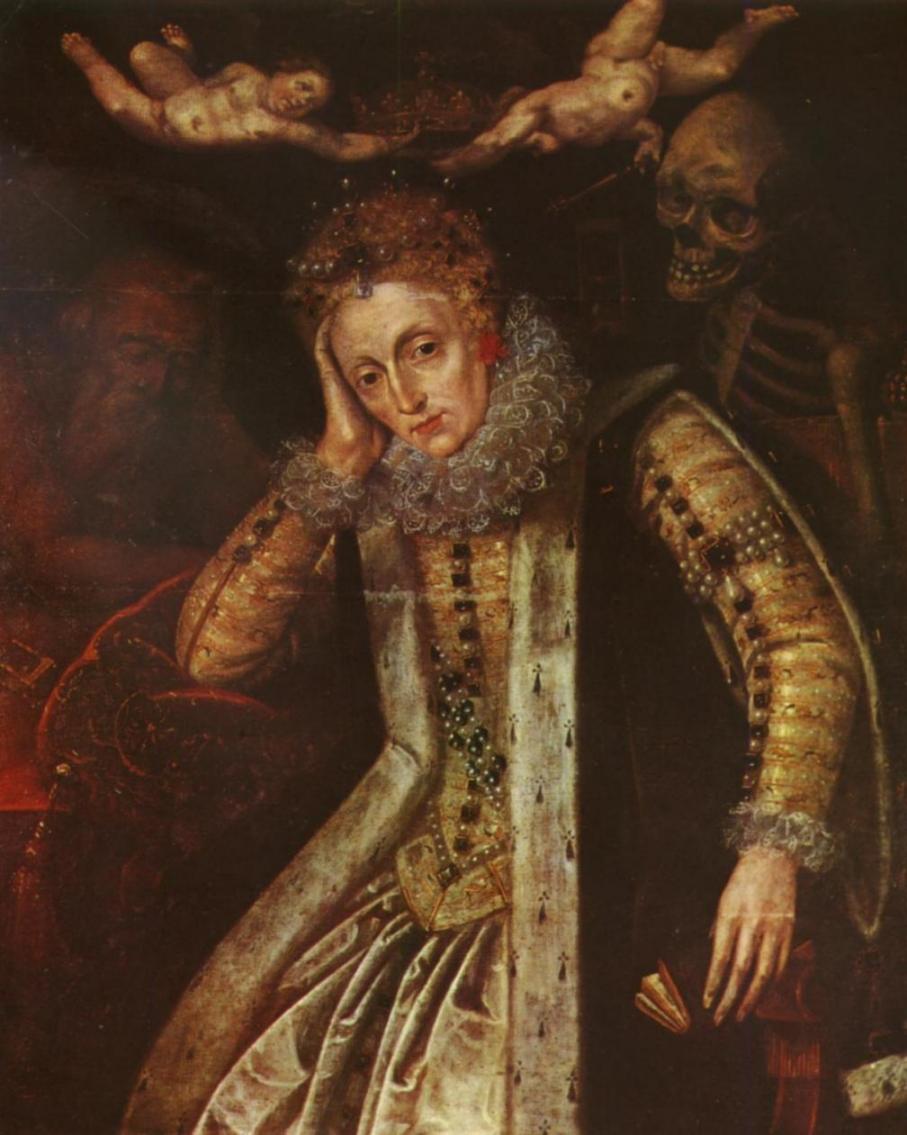I've made a songlist for Songs about Singing.
Here are two other links people here might like: Polyphony and Horses, or Art about Art
After that date, I started a page called Reflections on Mirrors.
Natural learning is about making connections, in history, philosophy, belief and practice.
Scatter it out and rearrange it!
Tie in music, art, science, geography, patterns, religion, animals, minerals or vegetables.
This is unschooling practice and strewing practice, except that it's as real as anything.
I've made a songlist for Songs about Singing.
Here are two other links people here might like: Polyphony and Horses, or Art about Art
 Mar 24, 1603 Queen Elizabeth I died. She was nearly 70, and had been queen of England since she was 25.
From the Death of Queen Elizabeth I:
Mar 24, 1603 Queen Elizabeth I died. She was nearly 70, and had been queen of England since she was 25.
From the Death of Queen Elizabeth I:In March 1603 Queen Elizabeth was clearly unwell and seemed depressed. She retired to one of her favourite homes - Richmond Palace. Stubborn as ever she refused to allow her doctors to examine her. She also refused to rest in bed - she stood for hours on end, occasionally just sitting in a chair. Her condition became worse and her ladies-in-waiting spread cushions across the floor. Queen Elizabeth eventually lay down on the cushions. She lay on the floor for nearly four days - mostly in complete silence. She eventually grew so weak that when her servants insisted on making her more comfortable in her bed she was unable to argue with them. The end was clearly near for the great old Queen. Her Councillors gathered around her. Soft music was played to soothe her. She had still not named James as her successor but she made a sign to Robert Cecil and it was interpreted that this was her wish.The funeral wasn't until April 28. The body was in a lead coffin, which I guess can keep Superman safe from kryptonite, and England safe from a month-old body.
 In the middle of the site linked above are advertisements for wrongful death claims (just in case anyone wants to sue, about Elizabeth's death, I guess. As she was childless, though, and others benefitted from the death, I don't guess there needs to be a claim.
If she WAS childless, that is...
There are hints and suggestions that she had a son, and a very bright one, too. Sir Francis Bacon.
There's a recent book out (2001-recent), not so much serious history, claiming that the plays of Shakespeare were written by a son of Elizabeth, Edward de Vere, the Earl of Oxford. That he wrote the plays, and William Shakespeare was used as a cover, kind of the opposite of ghost writing. A scholar wrote of the believers of that theory: “Oxfordians are the sub-literary equivalent of the sub-religious Scientologists. You don’t want to argue with them, as they are dogmatic and abusive.”
But women aren't having children as they're dying, though they might be thinking of their children. If they had any.
The images above and many others, including the funeral procession, effigy and tomb (though those weren't until 407 years and some weeks later) are here: http://www.tudorplace.com.ar/Documents/queen_elizabeth_gallery.htm
So what's the big connection?
Besides just everything in the 16th and early 17th century? Shakespeare? (Even way apart from the odd theory that the they might be related indirectly by contract.) Francis Bacon? (Even if they weren't related, they did correspond in a very intimate tone, and he was some kind of genius.) Exploration of the New World and victory over the Spanish Armada?
Elizabeth I reigned for 44 years 4 months and 5 days. Five other monarchs have ruled longer. Henry III in the 13th century, Edward III in the fourteenth (and so she died with the third longest reign) and since then, George III (160-1820), Victoria in the 19th Century, and Queen Elizabeth II, 1952 to still-counting. If Elizabeth II passes George III and Queen Victoria, she will be #1, but Elizabeth I will be #6 in any case.
In the middle of the site linked above are advertisements for wrongful death claims (just in case anyone wants to sue, about Elizabeth's death, I guess. As she was childless, though, and others benefitted from the death, I don't guess there needs to be a claim.
If she WAS childless, that is...
There are hints and suggestions that she had a son, and a very bright one, too. Sir Francis Bacon.
There's a recent book out (2001-recent), not so much serious history, claiming that the plays of Shakespeare were written by a son of Elizabeth, Edward de Vere, the Earl of Oxford. That he wrote the plays, and William Shakespeare was used as a cover, kind of the opposite of ghost writing. A scholar wrote of the believers of that theory: “Oxfordians are the sub-literary equivalent of the sub-religious Scientologists. You don’t want to argue with them, as they are dogmatic and abusive.”
But women aren't having children as they're dying, though they might be thinking of their children. If they had any.
The images above and many others, including the funeral procession, effigy and tomb (though those weren't until 407 years and some weeks later) are here: http://www.tudorplace.com.ar/Documents/queen_elizabeth_gallery.htm
So what's the big connection?
Besides just everything in the 16th and early 17th century? Shakespeare? (Even way apart from the odd theory that the they might be related indirectly by contract.) Francis Bacon? (Even if they weren't related, they did correspond in a very intimate tone, and he was some kind of genius.) Exploration of the New World and victory over the Spanish Armada?
Elizabeth I reigned for 44 years 4 months and 5 days. Five other monarchs have ruled longer. Henry III in the 13th century, Edward III in the fourteenth (and so she died with the third longest reign) and since then, George III (160-1820), Victoria in the 19th Century, and Queen Elizabeth II, 1952 to still-counting. If Elizabeth II passes George III and Queen Victoria, she will be #1, but Elizabeth I will be #6 in any case. [Elizabeth II] will have to reign until 2012 to reign longer than George III, 59 years from 1760-1820, and until 9th Sept 2015 when she will be 89 years old to better Victoria's record and become the longest reigning monarch.